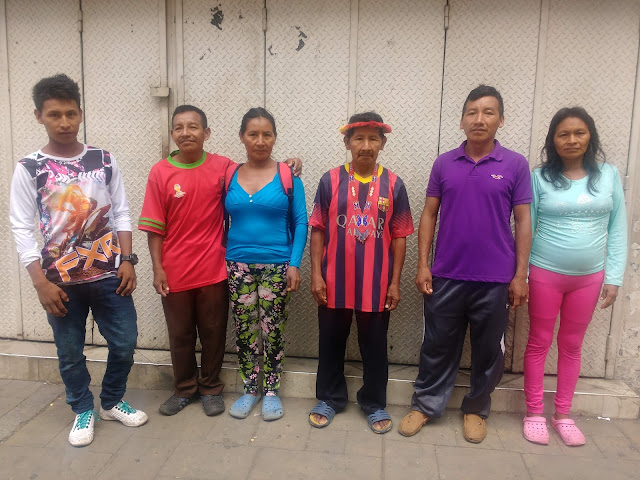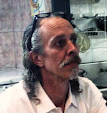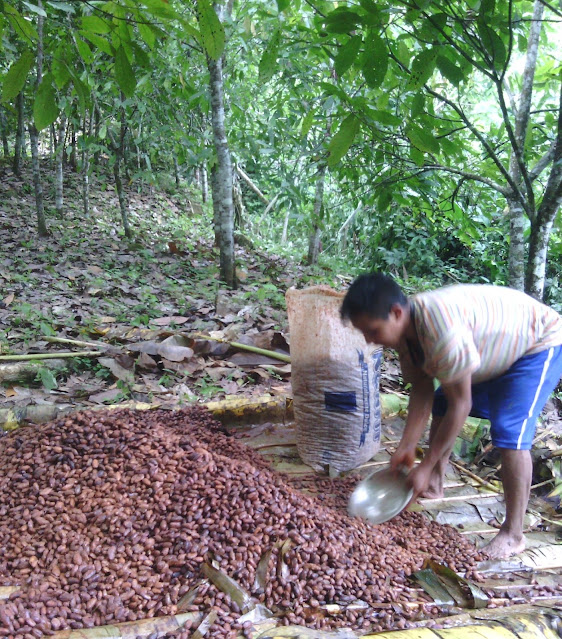De'Aruhuä Indigenous Craft Chocolate
The Beginning, First Blog Post
Never Thought I Would Be in the Chocolate Business
Several years ago I began a quest to live as far away from modern civilization and as close to primitive civilization as I could get and still be on the map. After 10 years of searching and visiting a region East outside of Puerto Ayacucho in Venezuela I finally got my wish and purchased a 40 hectare foundation (hobby farm) in 2013 which I decided to make into an ecovillage, its called Ekobius. It is the last non-indigenous private property located at kilometer 24 of the Via Gavilan roadway and is bordered on three sides by indigenous Piaroa territory, the next piece of private property or roadway to the South or East is over 1,000 kilometers in either direction located in Brazil or Guyana, literally at the edge of civilization bordered by wilderness.
The Piaroa, also known as the De'Aruhuä (day-are-wa) are the original inhabitants of the Guiana Highlands region (forested foothill canyons of the Guiana Shield) in the Indigenous State of Amazonas. In the Piaroa language their name De'Aruhuä means, "Guardians of the Forest" or "Masters of the Forest." It took several years before they warmed up to us as our friends. About a year ago some of the Piaroa people I know from having the ecovillage came to visit me while I was working in Caracas, they came to ask for my help to help them export to Germany where they heard they could get fair-trade pricing for the agricultural production of wild cacao. Traditionally they have only provided cacao for several local traders, however since 2014 it has become more difficult to get fair pricing from who are now government associated buyers.
This led me to spend several days investigating and researching online through every available source I was connected to including Facebook, LinkedIn and Twitter to help them find a market for their cacao. Personally at the time I did not know much about cacao or chocolate, except I had several trees at the Amazon farm which I had because of my horticultural interest in the plant and I knew that the neighbors (some indigenous families) grow it in the forests. I also discovered from them that the farmers were receiving less than $1 per kilo (sometimes as little as 30 cents) for their F1 premium cacao in Puerto Ayacucho, far below the fairtrade value and the quality being delivered. I immediately wanted to see them compete directly with the cacao traders, wholesalers and retailers, so I began the journey with them.
From the research I performed online I discovered that the Piaroa cacao was being used by a number of different companies to make fine and aromatic chocolate (companies like Soma, Castronovo, Tisana, and Escazu) and that their raw cocoa beans were being offered online for as much as $5-7 per pound in the United States and Europe. It was about then that I met Clay Gordon online using LinkedIn, he is a chocolate expert and author, he has an interactive blog and forum TheChocolateLife; Clay took an interest in the Piaroa beans and offered me some advice and help connecting with others who could provide a market for the beans. We spoke for several hours one day about chocolate and the importance of the genetics, cru and terroir of the Piaroa cocoa.
So I spent some time following up on Clay's advice writing to several buyers of fine cacao and sending a few samples out. While everyone we contacted were impressed with the Piaroa cocoa beans the red tape involved for the Piaroa to directly export their beans under the political circumstances are too much to bear and not practical without a commitment. Although we could find several potential buyers in North America after customs declarations, duty, freight and handling charges it became too complex for the size of their endeavor.
After probably 3-4 weeks learning all that I could about cacao (cocoa) and chocolate, writing 20 emails and sending out 10 samples I began to discuss with the Piaroa the idea of making the chocolate themselves, I proposed that by providing some of the people from their community we could make an indigenous produced product that would have very unique natural qualities. After several discussions with Piaroa community leaders we decided to start a chocolate company for their cacao with them.
I see many positive benefits in making chocolate, I love doing it as well, and I have a good background in food science, but if you had asked me 5 years ago I never would have imagined or thought about becoming a chocolate maker, much less with my indigenous neighbors.
Starting a Cooperative Chocolate Factory with the Piaroa
After meeting with more than 30 Piaroa people from the remote Paraguaza communities and knowing well another 150 neighbors who know me on the Catañiapo River, I know the Piaroa are not of a capitalist mindset, however like the rest of the people in the world they work and produce goods for money to buy essentials. The Piaroa are very peaceful, resourceful, reserved and humble people; as an indigenous culture they are most comparable to the Amish or Hutterites as a peaceful people, they are more focused on their communal values, well-being and the benefits that can be derived unconditionally in their communities from cooperation by their members together.
Living around the Piaroa and learning to respect them as a distinctive people with their own culture, traditions, customs, language and world-view; I also began to accept their differences and understand what was important to them and how to work with them successfully, it took just as long for them to trust me as their neighbor. In the Piaroa culture the ideal of competition among others or stockpiling of resources is evil, whereas cooperation is lauded, the concept of equality is prevalent between both men and women in Piaroa society. The Piaroa have a perfect combination of personal characteristics and social values for a cooperative business.
By involving me and the ideals of Globcal International the Piaroa are taking their first step towards sustainability, now two of their tribal members are now also ambassadors with Globcal International. Our cooperative social enterprise will include the entire supply chain, "forest-to-bar" chocolate considering the extent of territory and demographics we are developing a case study for the project to launch it as an initiative of the United Nation's Sustainable Development Goals (SDGs) because of the social impact that can be generated, it will potentially qualify for much more support from investment than anyone would have anticipated, as a relevant cause. Currently this project targets 12 of the 17 SDGs.
By June of 2019 we began to let our intentions be known about becoming involved in the development of a chocolate factory which we called "De'Aruhuä Cacao" which would be socially justified, managed and used to generate funding for the Piaroa communities and for Globcal International social investors. We began to develop a business plan by the end of the month.
Early into writing the plan I contacted Clay Gordon again, this time on Facebook and asked him to look over the plan, he agreed and gave me a few tips and we chatted further. Later after getting along a bit more with the business plan, I invited Clay to become a member in the cooperative formation and to help us author the business plan. Clay signed onto the project as an advisor, consultant and business developer providing his professional services as an authority on chocolate and to fact check the plan, in late August he wrote the introduction.
He created the ideal of a single cooperative entity called and described simply as the Piaroa Partnership Platform (PPP) which he suggested, "a cooperative social enterprise, in which investment can be sought, monies disbursed, oversight undertaken, training given, cocoa purchased, chocolate produced, and finished products marketed and sold internationally." Both of the Piaroa representatives that I am working with were very impressed with the ideals presented in the PPP proposal in the plan so they were adopted immediately.
Building the Ideal and Making it Real
To make the ideal of Piaroa Forest-to-Bar chocolate a reality I began taking the steps of creating an identity around the company and project the name in the social media. For lack of having professional photography and video productions we are still short in what we need for a well done presentation, however that will change soon and expect some very good photographs soon. Our logo is nice it is based on a Piaroa petroglyph. We are also already invested in three tons of their cacao, which we have on hand now.
The PPP is also under alternative development and open to partnership formation focused on their protection of a 5,000 square kilometer protectorate area through sponsored international scouting programs and providing agroforestry extension services in cacao growing communities. Globcal International has worked up a plan that is attractive to other countries as part of their national interest, important to nonprofits, ngos, educational institutions and the public in general that may want to help protect this biosphere and watershed protection area.
The plan currently under development and seeking partnerships is published online at the United Nations SDGs Partnership website as "Indigenous Agroforestry & Ecosystem Protectorate for the Piaroa of the Orinoco." The total cost of the PPP community interest project initiatives to be executed in the Piaroa communities is between $450,000-$630,000 to build the infrastructure in the communities to remove people from abject-poverty like conditions, supply the farmers with good hand tools, provide working clothes, build community centers, provide training, dig solar wells and construct new bathhouses, these activities will be developed and implemented in 13 selected villages based on goodwill and international cooperation development. These are among some of the things we hope to accomplish by connecting this project with the UN SDGs Agenda. Currently just a fundraising goal for initiating focused community improvements and implementing programs ad hoc based on budgets being fulfilled and new partnership developments.
As an SDGs Partnership Initiative of Globcal International the PPP qualifies for donations, grants, in-kind gifts and technical support from a great number of sources including departments of the United Nations, international foundations, non-governmental organizations, foreign embassies, international governmental organizations, corporations and individuals.
The business plan for the chocolate factory and De'Aruhuä brand is being developed independently as a part of the PPP, it will be owned by its own cooperative and private investors, likewise belong to the PPP, practically the facility will be a laboratory standard chocolate factory that can produce anyone's chocolate and provide a seal of origin. It will cost approximately $490,000 for the entire first two years of operations, including all real estate, remodeling, labor, materials, maintenance, supplies, training, utilities, and overhead to produce the first $1.5 million dollars worth of chocolate, that is a $1 million dollar profit in the first two years after expenses. Less the logistics, interest and administration of the business in subsequent years (from the third-year forward), the factory will be able to produce over 1 million dollars per year in chocolate at a cost of less than $100K per year to supply and operate. The factory would be community operated cooperative that produces chocolate as a sustainable way to produce a social benefit that accomplishes its greater goal.
There is more information on how to invest in the chocolate factory on the original website which was established earlier this year or you can invest here for $10 per share if you purchase a minimum of 10 shares you will be considered a non-voting member and consumer, currently we are accepting 1% memberships which is 1000 shares. The business plan is available to all those who join the PPP (De'Aruhuä Cacao) with 100 shares or more in the chocolate factory, it is also made available to members of Globcal International programs. If you would like a formal invitation please email dearuhua@globcal.net to request one.






